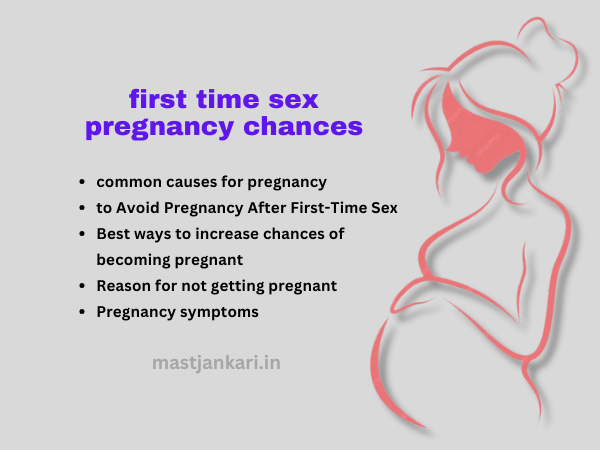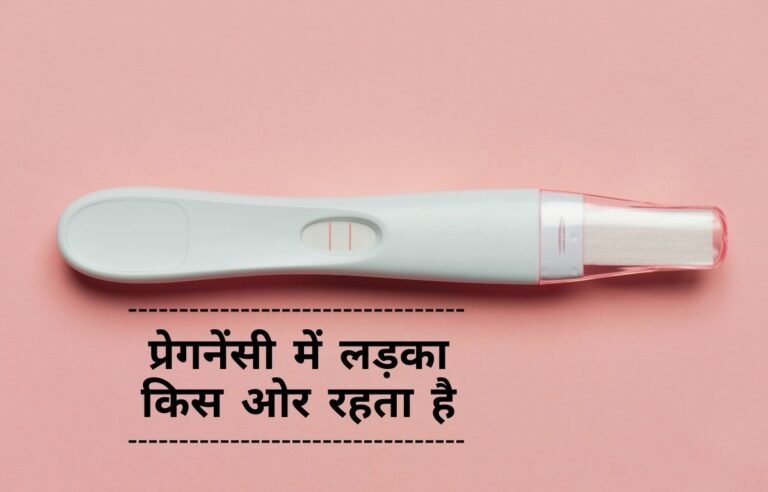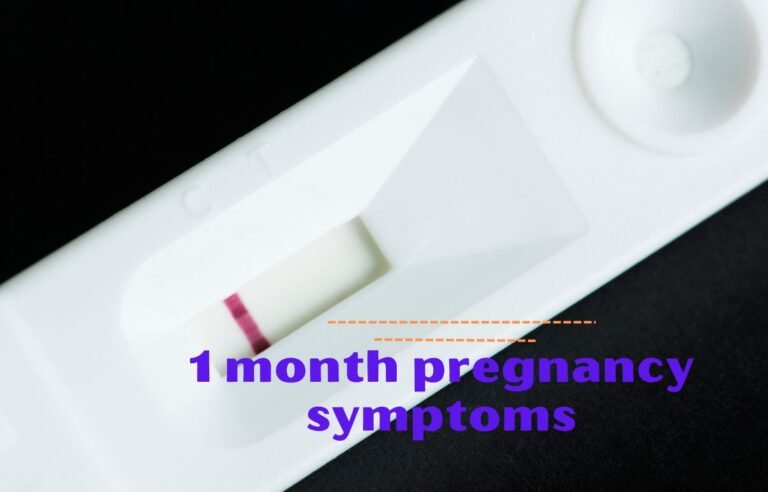Can First-Time Sex Lead to Pregnancy
Searching for first time sex pregnancy chances the answer is YES, for the first time engaging in sexual activity can result in pregnancy.

The chances of conception depend on various factors such as the woman’s menstrual cycle, ovulation timing, and the use of contraception. It’s important to be aware of these factors and take necessary precautions. You can visit here for common Pregnancy Symptoms (प्रेगनेंसी के शुरुआती लक्षण)
Qna related to ‘first time sex pregnancy chances’
common causes for pregnancy

There are various factors that can cause pregnancy during first time sex
- Ovulation Timing: If a woman has sex around the time of ovulation then there is a higher chance of pregnancy because Sperm can survive in the female reproductive tract for several days.
- Failure of Contraception: Failure to use any form of contraception during the first sexual encounter can increase risk of pregnancy. Condoms, hormonal birth control methods (such as pills or patches), and other contraceptives are effective in preventing pregnancy when used correctly.
- Ineffective Contraceptive Use: Contraceptive effectiveness depends on proper usage. For example, condoms should be used correctly, and hormonal methods must be taken according to the prescribed instructions.
- Unpredictable Menstrual Cycles: Menstrual cycles can vary in length, making it challenging to predict ovulation accurately. If a woman’s cycle is irregular, it might be more difficult to identify fertile days that can increase the risk of unwanted pregnancy.
- Sperm Viability: Sperm can survive in the female reproductive tract for several days. If unprotected intercourse occurs in the days leading up to ovulation, there is a chance that sperm may fertilize an egg.
- Youth and Fertility: Younger individuals may have higher fertility rates, increasing the chances of pregnancy. Age plays a role in reproductive health, and younger individuals may conceive more easily than those who are older.
- Lack of Awareness: Some individuals may be unaware of their fertility and reproductive health, leading to a lack of preparedness and contraception use.
It’s essential for individuals engaging in sexual activity, especially for the first time, to be well-informed about reproductive health, understand their menstrual cycles, and use reliable contraception to reduce the risk of unintended pregnancy.
Seeking guidance from healthcare professionals can provide valuable information and support in making informed decisions.
what are the best method to Avoid Pregnancy After First-Time Sex
If you are planning sex for the first time and want to avoid pregnancy chances then it’s crucial to explore effective contraception methods. These methods not only provide protection against unwanted pregnancies but also contribute to overall sexual health. Here’s a breakdown of some reliable options
- Condoms for Dual Protection:
- Condoms are a popular and accessible option that not only act as a barrier to prevent sperm from reaching the egg but also provide protection against sexually transmitted infections (STIs). It’s a versatile choice suitable for various situations.
- Hormonal Birth Control Options:
- Hormonal methods, such as birth control pills, patches, or injections, are highly effective in preventing pregnancy when used consistently and correctly. These methods work by regulating hormones to inhibit ovulation and create an inhospitable environment for sperm.
- Long-Acting Reversible Contraceptives (LARCs):
- LARCs, including intrauterine devices (IUDs) or hormonal implants, offer extended protection with minimal user intervention. Once inserted, they provide long-lasting contraception, making them suitable for individuals seeking a low-maintenance option.
- Emergency Contraception:
- In the event of contraceptive failure or unprotected intercourse, emergency contraception pills, commonly known as the “morning-after pill,” can be taken within a specific time frame to reduce the risk of pregnancy. It’s essential to act promptly for optimal effectiveness.
- Fertility Awareness and Tracking:
- Understanding menstrual cycles and fertility awareness methods can help individuals identify and avoid fertile days, reducing the likelihood of conception. This approach requires consistent tracking and awareness of one’s reproductive cycle.
- Combination of Methods:
- Combining different contraception methods, such as using condoms alongside hormonal birth control, can provide an extra layer of protection. This approach is often referred to as “dual protection” and enhances overall contraceptive efficacy.
- Consultation with Healthcare Professionals:
- It’s advisable to consult with healthcare providers to receive personalized advice on choosing the most suitable contraceptive method based on individual health, preferences, and lifestyle. Healthcare professionals can provide valuable information, address concerns, and guide individuals in making informed decisions about their reproductive health.
By exploring these effective contraception methods and seeking guidance from healthcare professionals, individuals can make informed choices to prevent unintended pregnancies after their first sexual experience.
Best ways to increase chances of becoming pregnant
Certainly! Here are some tips on increasing the chances of becoming pregnant:
- Understand Menstrual Cycle:
- Track your menstrual cycle to identify fertile days. Ovulation typically occurs around the middle of the cycle. Understanding your cycle helps you time intercourse for the most fertile period.
- Healthy Lifestyle:
- Maintain a healthy lifestyle by eating a balanced diet, exercising regularly, and managing stress. A healthy body weight and overall well-being contribute to reproductive health.
- Regular Intercourse:
- Engage in regular, unprotected intercourse, especially during the fertile window. Frequent sexual activity around ovulation increases the likelihood of sperm meeting the egg.
- Preconception Health Checkup:
- Schedule a preconception health checkup with a healthcare provider. Ensure you are in good health, address any existing medical conditions, and discuss any concerns related to conception.
- Fertility-Friendly Lubricants:
- Use fertility-friendly lubricants if needed. Some lubricants can impede sperm movement, so choosing products specifically designed for conception may be beneficial.
- Quit Smoking and Limit Alcohol:
- Smoking and excessive alcohol consumption can negatively impact fertility. Quitting smoking and limiting alcohol intake can improve your chances of getting pregnant.
- Limit Caffeine Intake:
- While moderate caffeine consumption is generally considered safe, excessive intake may affect fertility. Consider reducing your caffeine intake, especially if you are planning to conceive.
- Maintain Sexual Health:
- Ensure both partners maintain good sexual health. Treat any existing sexually transmitted infections (STIs) promptly, as they can affect fertility.
- Optimal Timing:
- Be mindful of the timing of intercourse in relation to ovulation. Having intercourse a day or two before ovulation and on the day of ovulation increases the chances of conception.
- Relax and Manage Stress:
- High stress levels can impact fertility it can inhibit the proper secretion of sex hormones. Practice stress-reducing techniques such as yoga, meditation, or deep breathing to promote emotional well-being.
- Supplement with Folic Acid:
- Taking folic acid supplements before conception and during early pregnancy helps prevent certain birth defects. Many healthcare providers recommend a prenatal vitamin with folic acid.
- Seek Professional Advice:
- If you have been trying to conceive without success, consider seeking advice from a fertility specialist. They can conduct tests to identify any underlying issues and provide guidance on fertility treatments if needed.

Reason for not getting pregnant
If you have had your first sex and are worrying about getting pregnant then There are several reasons why a person or couple may be experiencing difficulty in getting pregnant. Here are some common factors that can contribute to infertility:
- Timing and Ovulation:
- In some cases, couples may not be accurately timing intercourse with the woman’s fertile period. Ovulation irregularities or difficulties in predicting ovulation can contribute to this issue.
- Age:
- Female fertility tends to decline with age, particularly after the age of 35. Advanced maternal age can lead to a decrease in the quantity and quality of eggs, making conception more challenging.
- Sperm Health:
- Issues with sperm health, such as low sperm count, poor sperm motility, or abnormal sperm morphology, can affect the chances of fertilization.
- Fallopian Tube Blockages:
- Blockages or damage to the fallopian tubes can prevent the sperm from reaching the egg or hinder the fertilized egg’s journey to the uterus.
- Uterine Issues:
- Abnormalities in the uterus, such as polyps, fibroids, or structural issues, can interfere with implantation and pregnancy.
- Endometriosis:
- Endometriosis is a condition where tissue similar to the lining of the uterus grows outside the uterus. It can affect fertility by causing inflammation and scarring.
- Polycystic Ovary Syndrome (PCOS):
- PCOS is a hormonal disorder that can disrupt ovulation and affect fertility. Irregular menstrual cycles and anovulation (lack of ovulation) are common in women with PCOS.
- Weight Issues:
- Both underweight and overweight conditions can impact fertility. Maintaining a healthy weight is important for hormonal balance and reproductive health.
- Lifestyle Factors:
- Smoking, excessive alcohol consumption, and drug use can negatively affect fertility. High levels of stress can also impact hormonal balance and disrupt the menstrual cycle.
- Medical Conditions:
- Certain medical conditions, such as thyroid disorders, diabetes, and autoimmune diseases, can interfere with fertility.
- Previous Surgeries or Infections:
- Surgeries involving the reproductive organs or previous pelvic infections can lead to scarring and affect fertility.
- Genetic Factors:
- Some individuals may have genetic factors that contribute to infertility. Genetic testing may be recommended in certain cases.
If a person or couple is experiencing difficulties in getting pregnant, it’s advisable to consult with a healthcare professional or a fertility specialist. They can conduct a thorough evaluation, including medical history, physical examinations, and diagnostic tests, to identify the underlying causes of infertility.
Once the specific factors are identified, appropriate interventions or fertility treatments can be considered based on individual circumstances.
Article References:
Hsiu‐Wei Su, Yu‐Chiao Yi (2017) Detection of ovulation, a review of currently available methods (U.S. National Library of Medicine)
Amy H Herring, professor, Samantha M Attard (2013) Like a virgin (mother): analysis of data from a longitudinal, US population representative sample survey (The BMJ) https://www.bmj.com/content/347/bmj.f7102
Alison Taylor (2003) Extent of the problem (NCBI) https://www.ncbi.nlm.nih.gov/pmc/articles/PMC188498/
Sandra L.Hofferth (1987) CHAPTER 4TEENAGE PREGNANCY AND ITS RESOLUTION (Adolescent Sexuality, Pregnancy, and Childbearing, Volume II: Working Papers and Statistical Appendices) https://www.ncbi.nlm.nih.gov/books/NBK219216/
Disclaimer:
All the information is only for educational purposes please consult a health doctor before taking any action that is related to this content.





